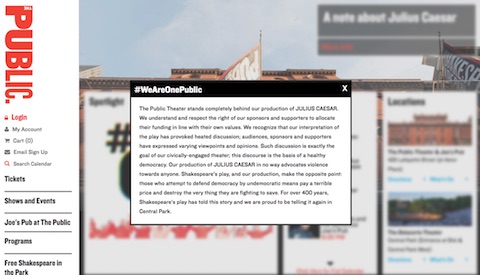The Public Theater’s classy response to critics of its “Julius Caesar”

The Public Theater, producer of Shakespeare in the Park, justified its production of a Donald Trump-tinged Julius Caesar. Unlike its departing sponsors, Delta and Bank of America, The Public Theater defended its decision front and center on its website, and with a short speech before a performance. This is the right way to respond to an attack.
Even in a brief statement, The Public Theater acknowledges the subtleties of its position
When Delta and Bank of America deserted The Public Theater, the play became a loyalty test — if you supported Trump, you were supposed to hate the play and cheer its departing sponsors; if you loved the arts, you were supposed to boycott the sponsors and lament censorship. These are petty and ill-considered positions, because there’s a lot more nuance here. The Public Theater responded by citing that nuance. Here’s the statement that is literally front and center on its website.
The Public Theater stands completely behind our production of Julius Caesar. We understand and respect the right of our sponsors and supporters to allocate their funding in line with their own values. We recognize that our interpretation of the play has provoked heated discussion; audiences, sponsors and supporters have expressed varying viewpoints and opinions.
Such discussion is exactly the goal of our civically-engaged theater; this discourse is the basis of a healthy democracy. Our production of Julius Caesar in no way advocates violence towards anyone. Shakespeare’s play, and our production, make the opposite point: those who attempt to defend democracy by undemocratic means pay a terrible price and destroy the very thing they are fighting to save. For over 400 years, Shakespeare’s play has told this story and we are proud to be telling it again in Central Park.
This is a masterwork of brevity (139 words) and balance. This statement:
- Doesn’t back down.
- Acknowledges sponsors’ rights to withdraw support, rather than firing back.
- Points out what Bank of America missed in its statement: that provoking discussion is part of what art is supposed to do.
- Explains that the play doesn’t glorify assassination, but in fact reveals that no matter how bad you think the problem is, it makes things worse.
- Gives Shakespeare credit for that message, rather than the play’s producers or actors.
I was also impressed with the statement that The Public Theater’s artistic director, Oskar Eustis, made before yesterday’s performance:
A brief clip of remarks from Oskar Eustis before the show begins. Happy opening, JULIUS CAESAR. pic.twitter.com/84zx8KgvxN
— The Public Theater (@PublicTheaterNY) June 13, 2017
When you’re under attack, learn from this
When you’re threatened, come back to this statement. The truth, simply stated, is your defense. It’s far more effective than lashing out at your attackers.
Because it takes a little thought and maturity, this measured response isn’t typical in today’s internet-inflamed dialogues. But for that very reason, it will stand out. Respond with class and sincerity. People will notice.
In this sentence: “When Delta and Bank of America deserted The Public Theater, the play became a loyalty test — if you were opposed to Trump, you were supposed to hate the play and cheer its departing sponsors;”
Did you really mean to say “…opposed to Trump”?
I would have thought the opposite.
Yeah, I got that backward.